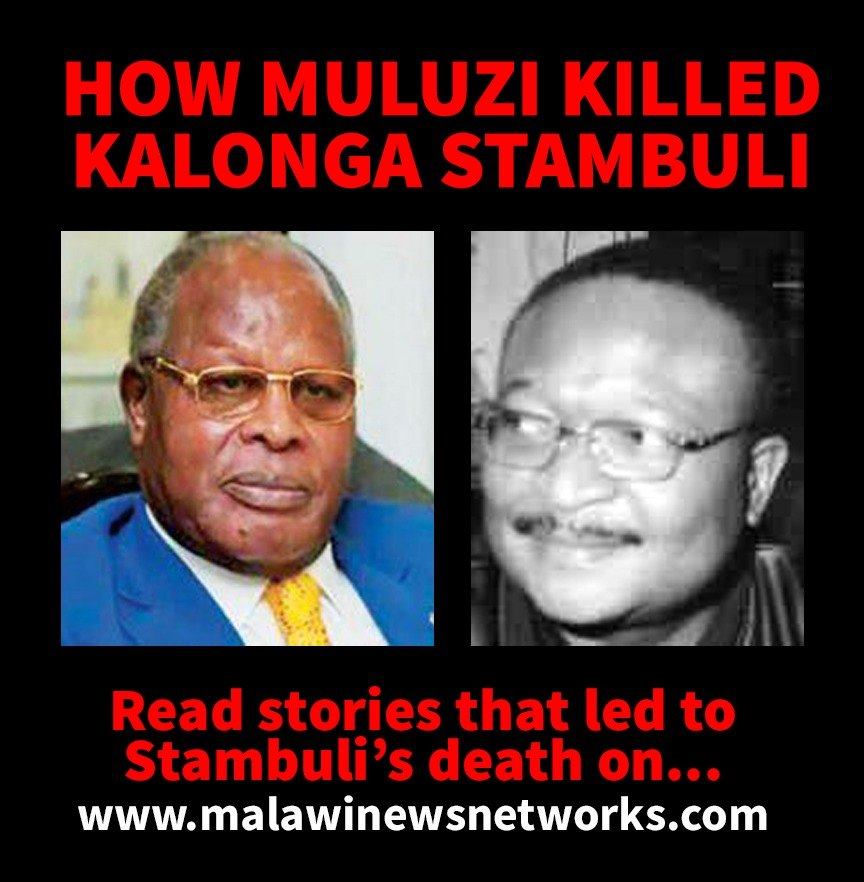
We continue to give you a dossier of corrupt scandals by former President Bakili Muluzi as exposed by his close aide Precious Kalonga Stambuli before Muluzi killed him in December 2003.
BAKILI MULUZI CORRUPT PRACTICES WHILE IN OFFICE AS PRESIDENT OF MALAWI
National Drilling Company
High Customs Evasion
Altaf Gani, Altaf Mahomed, Rati Kotecha
DONATION TO MALAWI ARMY ($2 MILLION)
Government of Taiwan donated a cheque for $2 million for construction of houses in the military barracks. The cheque was deposited in Muluzi’s personal account. In due course the treasury was asked to produce K30 million to commence construction of the houses. At the time K15 was equivalent to $1.
MPTC
During the early days of the government, a member of Parliament for Ndirande, Mr. Lawrence Makata had died as a result of a heart attack. The by-election that followed produced one of the most bitter fights in the record of electioneering in Malawi. The main weapon of the UDF was cash.
During 1995, the Malawi Post Office was undergoing a transition that was to produce three separate institutions, namely; Malawi Post Office, Malawi Savings Bank and Malawi Telecommunications Limited. As a transitional measure, it was agreed that the Post Office would be used as an agent collecting cash on behalf of the savings bank. This was only to allow MSB to establish its own network for cash collection as well as disbursement. In the interim period all cash deposited was to be conveyed to MSB as hard cash, at least within Blantyre, Zomba, Lilongwe and Mzuzu.
This system provided the missing link for the President to intercept the cash. A system was developed where a low level accountant simply bundled all the cash requested every day and delivered a trunk to the Palace. The Postmaster General (Mr. Mijiga) declined involvement as well as his engineer deputy (Mr Mtunga). This left only Mr Makawa as the only and key collaborator in the scam.
PART 1. EXERCISE BOOK SCANDAL
In 1994 Malawi experienced the first blatant act of corruption involving the purchase of exercise books worth 300,000 pounds at a price of 1.9 million pounds, from a company based in Leicester. The suppliers of the consignment (Fieldyork International) was run by Kenyan born British Asians who had financed the ruling party during the election campaign.
The storm over the exercise books developed prompting the intervention of the British High Commission in Malawi, but only after the first installment of 300,000 pounds had been paid. Meanwhile the President succumbed to pressure to establish a commission of inquiry while I was dispatched to the UK to visit two persons who were allegedly planning to establish a lottery in Malawi.
I was taken to the offices of their company called Wind Rush Consultants in Leicester where I was handed an envelope containing 30,000 pounds in cash. At that time it did not occur to me that this was 10% of the deposit paid against the 1.9 million pounds due for the exercise books.
On my return to Malawi I handed the envelope to the President and settled down to formulating the lottery project. By this time the reporting on the exercise book scandal had advanced to a level where names of proprietors of Fieldyork were being mentioned in the newspapers. It was at this stage that I matched the names on the lottery project and the exercise book scandal.
On further reflection, I became suspicious of the manner in which I had been dispatched to the UK. Initially, I was made to go on a visit to pre-shipment operations of SGS in Zambia and South Africa. While I was hoping to return, the Malawi Ambassador in South Africa handed me an envelope containing 5,500 South African Rands with instructions that I proceed to Mauritius to follow up earlier inquiries for job placements for Malawians in the sugar industry.
On arrival at Gold Crest Hotel in Mauritius, I found a request that I telephone State House in Blantyre. This is when the President instructed that I proceed to the UK to attend the launch of the Camelot Lottery Project and meet a consultant of the proposed lottery project in Malawi, Dennis Vaughan. The Asian sponsors to the project were identified by their first names only as Pramod and Vijay.
Upon seeing them I recognised the fact that they had been to State House in the company of Vali Tarmahomed and Salim Tayub. The former is a cricketer who I personally knew the team from Fieldyork, while the latter was a family member of the Tayubs who own Transglobe, Tayub Furnishings, and a conglomerate stationary company, Xerox.



